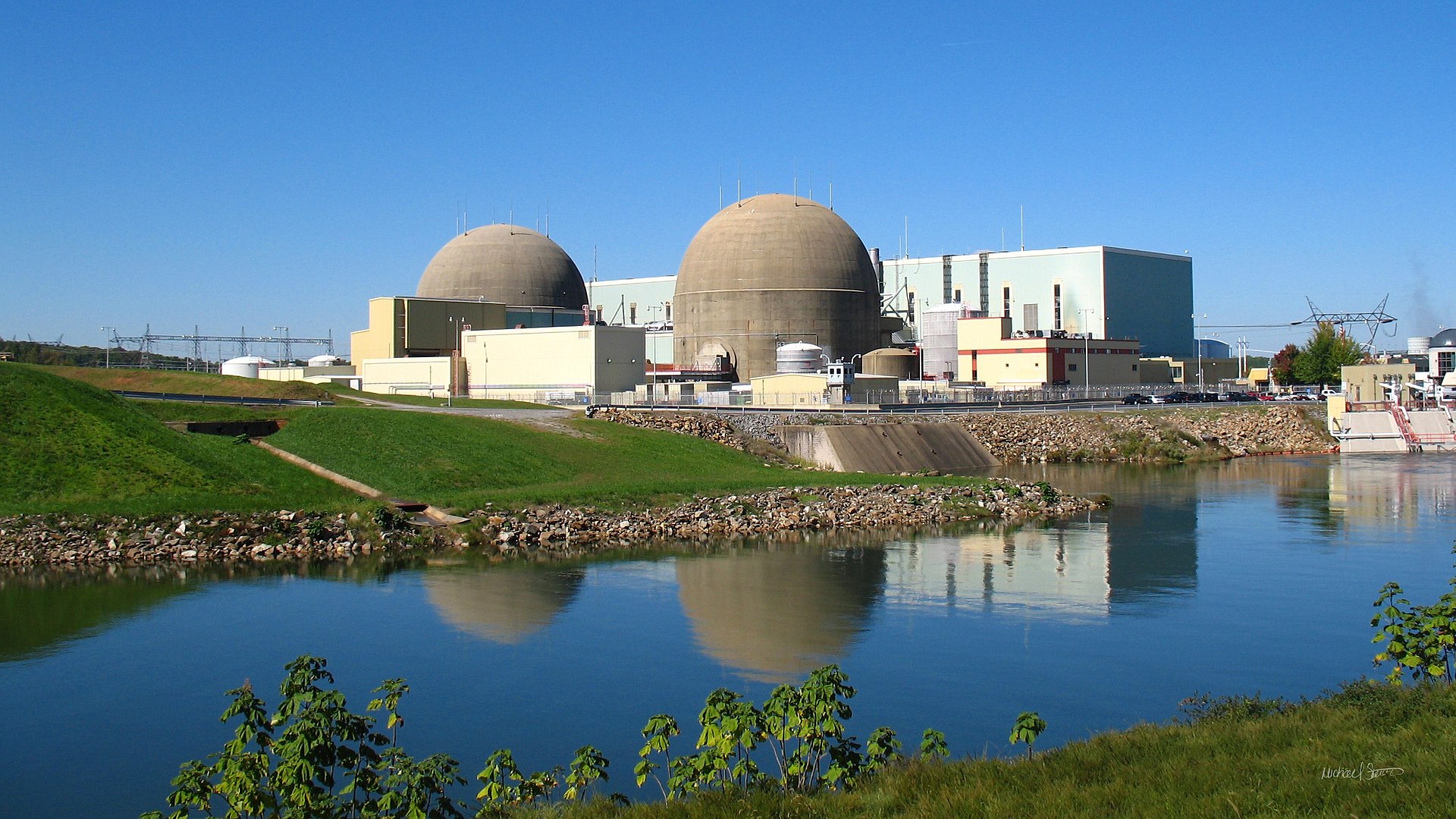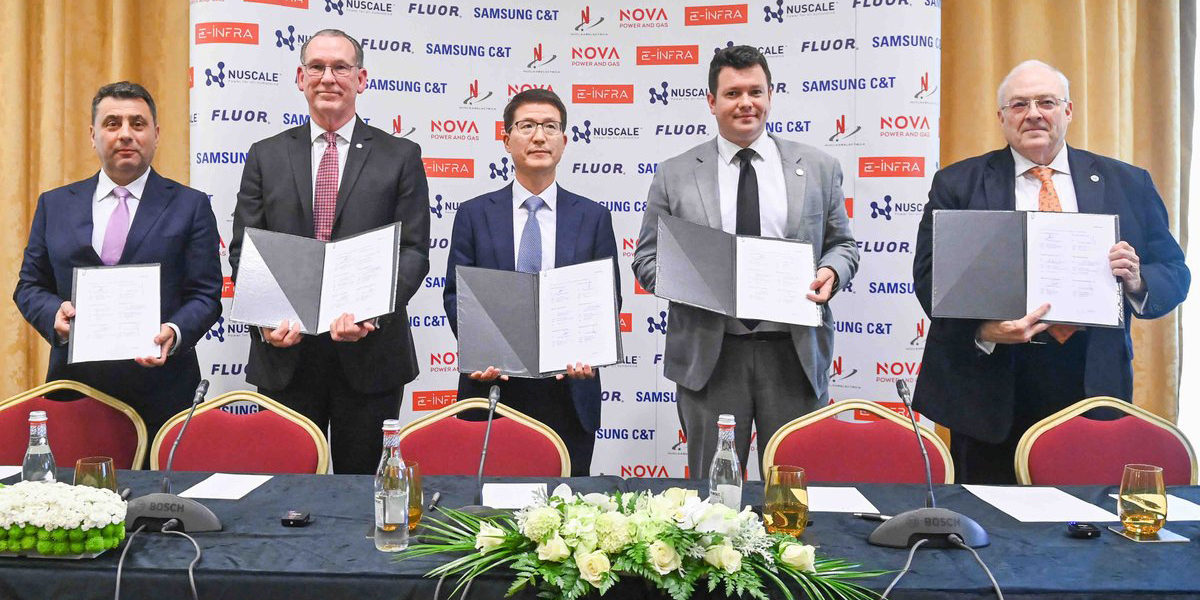NuScale E2 Center opens at Ohio State

NuScale Power Corporation this week announced the opening of its Energy Exploration (E2) Center at the Ohio State University in Columbus.


NuScale Power Corporation this week announced the opening of its Energy Exploration (E2) Center at the Ohio State University in Columbus.
U.S. and African officials announced from a nuclear energy summit last week a new partnership between Nuclear Power Ghana and Regnum Technology Group, an American small modular reactor developer using NuScale Power’s design.

Dominion Energy Virginia has issued a request for proposals from leading nuclear companies to study the feasibility of putting a small modular reactor at its North Anna nuclear power plant.
While the utility says it is not a commitment to build an SMR at the site, the RFP is “an important first step in evaluating the technology and the North Anna site to support Dominion Energy customers’ future energy needs consistent with the company’s most recent Integrated Resource Plan.”

José Reyes
Innovations with small modular reactors, which offer a compact, efficient alternative to traditional baseload power plants, are at the forefront of a new era of nuclear energy production that can reshape how we approach industrial decarbonization.
As global energy transition efforts progress, it is essential to examine the potential these advancements hold for reducing carbon emissions. Nuclear energy has long been recognized for its ability to generate vast amounts of electricity without emitting greenhouse gases. The introduction of SMR technology represents a pivotal shift, addressing many previous challenges to nuclear deployment and opening new pathways for the integration of nuclear energy into industrial sectors.
The innovative yet simple design of NuScale’s SMR technology provides a cost-competitive, safe, and scalable solution for a wide range of energy needs.
The White House asked for nearly $1.6 billion in funding for the U.S. Department of Energy’s Office of Nuclear Energy in the fiscal year 2025 budget proposal, released earlier this week. The requested funding is about 10 percent lower than the FY 2024 budget appropriation but still requires congressional review and approval.

Crownhart
“I’ve got nuclear power on the brain this week.” So writes climate and energy reporter Casey Crownhart in a recent edition the Spark, the MIT Technology Review’s climate newsletter. In her article, Crownhart describes how, while she was conducting research on advanced nuclear energy for another article, she “went down some rabbit holes on . . . potential options for future nuclear plants” and has “reached new levels of obsession” about nuclear energy.
Nuclear primer: Crownhart’s article could serve as a primer for both basic nuclear and advanced nuclear technologies. She begins by discussing the “two absolutely essential pieces” of conventional nuclear power plants—namely, the enriched uranium fuel and the pressurized water cooling system—and explains that the cooling system “keeps the whole thing from getting too hot and causing problems.”
NuScale announced today a 28 percent reduction in full-time staff, affecting 154 workers, as part of the company’s move to focus resources on “key strategic areas”— including deployment of its small modular reactor.

The new year is here, and so it is time for the Nuclear News review of 2023's top stories. The recap will appear in the January issue of the magazine, on its way to American Nuclear Society members right now. In the meantime, all ANS members can read the year's issues in the ANS member center, and also review some of the most-read stories from Nuclear Newswire below. Here’s to a Happy New Year!

“The tools of the academic designer are a piece of paper and a pencil with an eraser. If a mistake is made, it can always be erased and changed. If the practical-reactor designer errs, he wears the mistake around his neck; it cannot be erased. Everyone sees it.”
Many in the nuclear community are familiar with this sentiment from Admiral Rickover. A generation of stagnation in the industry has underscored the truth of his words. But as economies around the world put a price on carbon emissions, there’s a renewed sense of urgency to deploy clean energy technologies. This shifts the global balance of economic competitiveness, and it’s clear that the best path forward for nuclear requires combining the agility of private innovators with the technology and capabilities of national laboratories.

A team of experts from the International Atomic Energy Agency recently concluded an eight-day mission to Estonia, finding that the Baltic state has developed a comprehensive assessment of its nuclear infrastructure development needs, enabling the government to make an informed decision on whether to pursue a nuclear power program.
Standard Power, a provider of infrastructure as a service to advanced data processing companies, has chosen NuScale Power as the technology provider for its plans to develop two small modular reactor–powered facilities in Ohio and Pennsylvania to run nearby data centers, the Portland, Ore.-based SMR developer announced on October 3.
The U.K. government has chosen six companies to participate in the next stage of its small modular reactor competition: EDF, GE Hitachi Nuclear Energy, Holtec Britain Limited, NuScale Power, Rolls-Royce SMR (the only real home team), and Westinghouse Electric Company UK Limited. According to the government’s October 2 announcement, the advanced technologies offered by these firms are “the most able to deliver operational SMRs by the mid-2030s.”
Gateway for Accelerated Innovation in Nuclear (GAIN) has awarded separate vouchers to NuScale Power and Metatomic Energy to support the development of their small modular reactor and spent nuclear fuel conversion technologies.
Chubu Electric Power Company, owner and operator of the three-unit Hamaoka nuclear power plant in Japan’s Shizuoka Prefecture, has entered into an agreement to acquire issued shares in U.S. small modular reactor firm NuScale Power from Japan Bank for International Cooperation (JBIC), the utility announced on September 7. (JBIC bills itself as a government-owned, policy-based financial institution that prioritizes investment in businesses that will protect the global environment.)

Kerry
During a side event held at last week’s Three Seas Initiative Summit in Bucharest, Romania, special presidential envoy for climate John Kerry announced U.S. actions to further the role of new nuclear technologies in accelerating the clean energy transition in Europe.
These actions, according to a September 7 media note from the U.S. State Department, expand on Romania’s leadership role in deploying the first small modular reactor in Europe and in converting a former Romanian coal plant to an SMR facility.
Building on his rollout of the Project Phoenix initiative at last year’s COP27 climate change conference in Egypt, Kerry said that proposals from the Czech Republic, Poland, and Slovakia have been selected to participate in the project and will receive support for coal-to-SMR feasibility studies.

The Nuclear Regulatory Commission has accepted for formal review NuScale Power’s standard design approval (SDA) application for its updated small modular reactor design, the Portland, Ore.–based firm announced yesterday.

CFPP LLC, the limited liability company established by Utah Associated Municipal Power Systems (UAMPS) in 2020 to bring its Carbon Free Power Project to fruition, has applied to the Nuclear Regulatory Commission for a limited work authorization (LWA) to permit certain early project construction activities prior to the issuance of a combined license (COL). In a July 31 news release, CFPP said that should its application be approved, early-scope construction on the small modular reactor project would likely begin in mid-2025.

Six companies—NuScale Power, Romania’s nuclear plant operator Nuclearelectrica, E-Infra, Nova Power & Gas, Fluor Enterprises, and Samsung C&T Corporation—signed a memorandum of understanding on June 13 to collaborate on the deployment of NuScale’s VOYGR small modular reactor plants in Central and Eastern Europe, starting with Romania.

NuScale Power has signed an agreement with training and consulting firm Accelerant Solutions for the development and implementation of a reactor operator training program, the Portland, Ore.–based small modular reactor developer announced on June 7.
NuScale Power announced yesterday that it has joined the Romanian Atomic Forum, aka Romatom, as a supporting member “to champion the association’s nuclear energy goals and further the next generation of advanced nuclear technology experts, technologists, and operators in Romania.” The move further deepens the American small modular reactor company’s commitment to the deployment of a VOYGR SMR plant in the Central European state.